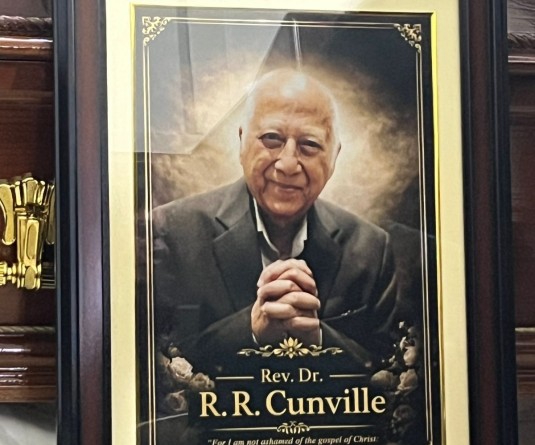
Ekyimo Shitirie
Kohima
Is rain the nemesis of road? Rain seems to follow roads and make them break out in potholes. For all its image as the gentle source of life-giving water, rain, we are given to believe, batters the road, seeps through the thin top layers, and turns the underlying earth into mush. The surface gives in as wheels roll on and a scattering of potholes appear in the wake. More wheels grind and churn up road materials from the potholes as they splash through, turning them into little ponds. But unlike the unspoken statement of gushing rainwater over drainless roads, protests come in murmurs, never in torrents thanks to the sense of fatalism of the public.
Rain is the cause of bad roads: this is the official line. On an impulse, the statement is true. Gauging from the behavior of the rain, the argument that it causes roads to go bad is not without substance. Rain is a tragic virtue. It paints the landscape green and washes away its foundations. It waters rice fields and drowns them in floods. In a moment of quirkiness, rain would quench parched hillsides and exact its price in megatons of mudslides. It slumps the slush on the road heavy, and sucks the jellified earth out from beneath the road, collapsing it. It would defy reason and go on acting out its oddities of helping in building and destroying, raising and sinking, of infrastructure and human enterprise, of hope and surfaced roads. The rain oscillates between good and evil, testing human resilience and exposing their vulnerabilities and vile nature.
The mysterious rain lends itself to blame and is disposed to taking a bad name. But the woke generation is hardly convinced with the official line. According to them, rain is the convenient scapegoat. They are always incisive in their assessments and see the contrary. It’s in their nature to play the devil’s advocate in silly arguments or over serious issues. A debate could ensue with the citizens taking sides. Whether one swallows the official statement whole or takes it with a pinch of salt depends on which side of the great divide they belong: the murky world of contracting and constructing processes, or the artless realm of the silent majority.
The loudest argument against the statement is that, in the truest engineering sense, rain does not cause roads to go bad as much as bad engineering does. The rain essentially exposes incompetence and corruption. It is only auditing performance of the whole process of road construction. It is bad engineering when the mix of materials used in the road construction falls short in quantity and quality. The rain will expose this. It is a bad engineering process when the site engineer sent from the establishment looks the other way while the construction workers and the contractor’s mohoror become engineers. We will know that the road construction process turned topsy-turvy when the contractor assumes VIP status and the site engineer loses his voice. The performance auditor will reveal padded progress reports and unduly large running bills, and false completion certificate and its approval. But it will not tell why the completion certificate was approved and the bill was released in full. The rain will simply come and wash away the blackened road surface along with the engineer’s professionalism down the gully. This is how years of training in civil engineering is wasted at the actual place of road construction.
The debate may rage on but participants must tell natural causes from engineering defects. In the meantime, roads may not remain in a state of disrepair.
Roads and bridges mean a lot more than any other infrastructure. They are the foundation upon which other forms of infrastructure are built and development and progress are brought about. People’s living condition is a function of the physical conditions of roads and bridges: the better the road condition, the higher is the quality of life. Bad road is dehumanizing, and in this age good road is a human right. Good roads mirror good governance on the part of the state. On the other hand, a state that fails to provide good roads is a failed state because it does not have the competence to provide even the most basic need.
In a freak twist of the economy, road projects themselves may become an industry, not enabler of industries. Such a grotesque scenario may become a reality in the absence of any other meaningful economic activity. The only way to make money would be obtaining contracts for road projects and constructing them. Road construction would be seen as a profit making enterprise and not as a public investment in basic infrastructure. Interestingly, this road industry would give road blocks to potential investments and local businesses. The state’s economic and social progress would be frozen in time, caught in a vicious cycle between cause and effect of the road industry.
To restore roads to their rightful place as indispensable infrastructure for development, there must be rethinking on cuts, political funding, and non-state taxes. The present system kills the proverbial chicken that lays the golden eggs and is unsustainable even for these cuts and taxes. The best way to sustain cuts and taxes, if they must remain, is to nurture industrial and economic development and take the cuts and taxes from a part of the profits. The flourishing economy will absorb any shock from the cuts and taxes. This may be called practical or sustainable or good corruption that only an oxymoron can describe. It would be a unique system where corruption is not eradicated but allowed to thrive along with the flourishing economy.
This is the age of rain whose march is unstoppable. Rain is the face of nature. An angry rain is an angry nature fighting back after enduring years of abuse. The behavior of rain is a reflection of nature as one with an attitude. Over many years, nature has acquired some sinister nature. It will undo what it has helped build up.
In this age of rain and thunderstorm, “good” is not good enough as far as roads and bridges go. Only weather-resilient roads can meet the fury of the rain head-on. A government that is committed will be able rise to the challenges, build resilient infrastructure and prop up state’s standing as a living entity. Then the people will also not feel ashamed of facing the world.





